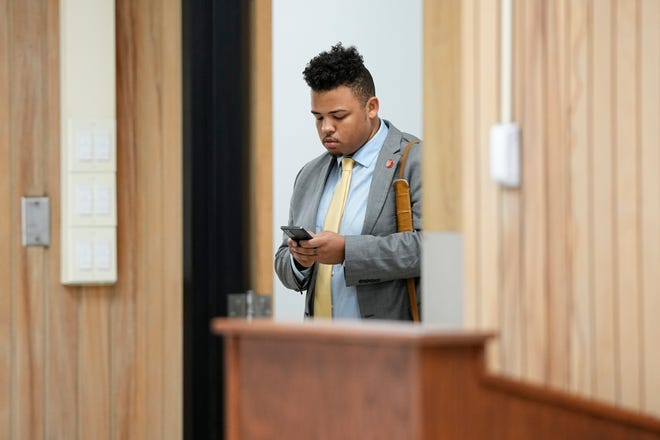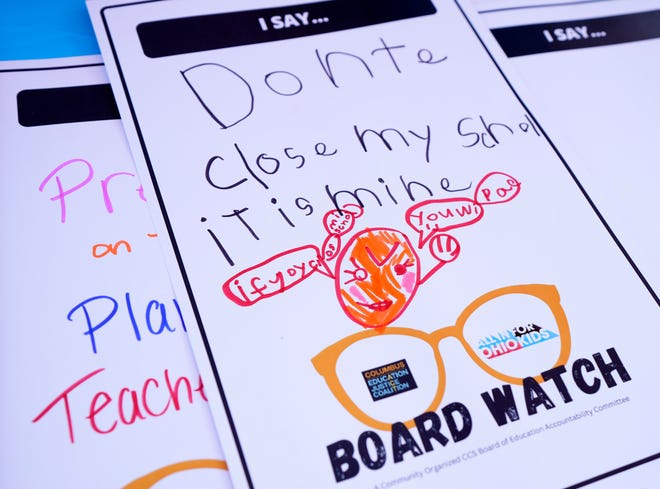Ohio Gov. Mike DeWine signed a bill Wednesday requiring districts to make policies reducing student phone use. Are central Ohio districts prepared?
The new law, which passed the Ohio House last week, requires K–12 school districts to create a policy to reduce cellphone distractions and limit cellphone use as much as possible during school hours, as The Dispatch previously reported. The Ohio Department of Education and Workforce would create a model policy for schools that don’t choose to create their own.
Gov. Mike DeWine and Lt. Gov. Jon Husted have made student cellphone and social media use a priority. On Wednesday, DeWine said at Karrer Middle School in the Dublin City Schools district that the bill he was signing ensures every school has a discussion about cellphone distractions in schools.“Cellphones in classrooms pose a significant challenge to learning, undermine instruction, and expose our kids to potential harmful content,” DeWine said.
John Marschhausen, Dublin City Schools superintendent, thanked the governor and lieutenant governor Wednesday for their work on cell phones, saying that they had taken action just a few months after holding a town hall with educators at Dublin City Schools in March.
“We know that cell phones in our schools are a distraction,” Marschhausen said. “We know that cell phones in our school and the proliferation of social media have a negative impact on the students that we serve.”
Central Ohio districts feel OK under new state law
Some of the region’s largest districts say they are confident that their policies address student cell phone use during the school day.
In South-Western City School District, the fifth-largest in the state, the board of education was actively working on updating their cell phone policy before the state gained interest on the topic, according to spokesperson Evan Debo. On Monday, the board heard the first reading of a proposed policy that reduces cell phone use and limits use during school hours to when permission is given by a teacher or administrator.
“While the district has had an existing policy that restricted student cell phone use, the amended policy brought forward on Monday enhances expectations and understanding regarding their limited use in schools,” Debo said.
The board plans to go through a second public reading on the initiative vote on June 10 before the new policy is fully adopted.
Olentangy Local Schools, the state’s fourth-largest district, said that it does not believe legislation will have an impact on its district. While phones are not banned on school property, the policy for their use is strict, according to spokesperson Amanda Beeman.
In elementary school, for example, cell phones can’t be used on the playground, and use is at the discretion of building administrators. At the high school and middle school levels, there may be more leniency at lunch or during downtime. Outside of the specific places and times when a phone is allowed to be used, it must be away, or there may be discipline.
Columbus City Schools, the state’s largest with over 45,000 students, told The Dispatch that the district “has policy in place that speaks clearly to personal communication devices.” Under CCS policy, cell phones should be stowed during the instruction day, unless they are being used as part of the instruction.
Westerville City Schools said it contracts with a third-party group, Neola, to ensure all policies are compliant with state law. They will review the new law, compare it to the district’s policy and provide necessary updates, spokesperson Greg Viebranz said.
“The bottom line is that we’re going to make sure we’re compliant, whether that’s possible through current policy or if we need to make necessary updates,” Viebranz said.
Experts: Emerging science shows student phone use is bad for learning
Many existing studies give evidence that allowing phones in the classroom negatively impacts test scores and long-term learning retention, according to Harvard University. However, the research also notes that many bans are repealed due to student and parent unpopularity, and in urban districts, often because cell service remains the only method of connectivity for some students.
A 2021 U.S. Department of Education study of existing research found that while some studies have shown that cellphone use in a classroom can help prepare students for work and inspire innovation, others demonstrate the detrimental effect of being distracted from education, as well as a rise in problems like cheating and teen sexting.
Heather Hill, a professor of teacher learning at the Harvard Graduate School of Education and expert on education policy, said the literature that exists on cell phone usage in classrooms shows it has a negative effect on learning outcomes.
She said it is probably a good move by the state to increase student engagement and give teachers one less thing to manage while teaching.
“This is also backed up by what we hear from teachers, which is that when kids have their cell phones or their computers enabled to do texting, they’re just not fully engaged in class,” Hill said. “Classroom engagement is probably the number-one predictor of actual learning.”



































